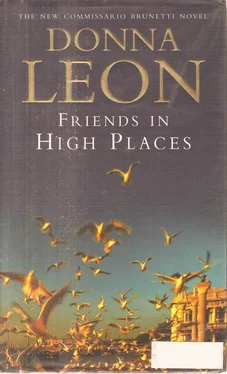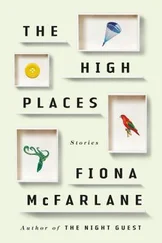Brunetti got to his feet. ‘I’ll leave you to finish your lunch, Signor Caberlotto,’ he said, extending his hand.
Caberlotto took it and returned the pressure. He went with Brunetti down the hall to the outer door and pulled it open. There, standing on the higher step and looking down at Brunetti, he said, ‘He was a good man. I didn’t know him well, but I liked him. He always said kind things about people.’ He leaned forward and placed his hand on Brunetti’s sleeve, as if to impress him with the importance of what he had just said, and then he closed the door.
On the way back to the Questura, Brunetti stopped to call Paola and tell her he wouldn’t be home for lunch, then went into a small trattoria and ate a plate of pasta he didn’t taste and a few pieces of chicken that served only as fuel to propel him into the afternoon. When he returned to work, he found a note on his desk, saying that Vice-Questore Patta wanted to see him in his office at four.
He called the hospital and left a message with Dottor Rizzardi’s secretary, asking the pathologist if he’d perform the autopsy on Francesco Rossi himself, then made another call that set in motion the bureaucratic process that would order that autopsy to be performed. He went down to the officers’ room to see if his assistant, Sergeant Vianello, was there. He was, at his desk, a thick file open before him. Though he wasn’t much taller than his superior, Vianello seemed somehow to take up much more space.
He looked up when Brunetti came in and started to get to his feet, but Brunetti waved him back to his seat. Then, noticing the three other officers who were there, he changed his mind and gave a quick lift of his chin to Vianello, then nodded in the direction of the door. The sergeant closed the file and followed Brunetti up to his office.
When they were seated facing one another, Brunetti asked, ‘Did you see the story about the man who fell from the scaffolding over in Santa Croce?’
‘The one from the Ufficio Catasto?’ Vianello asked, but it really wasn’t a question. When Brunetti confirmed that it was, Vianello asked, ‘What about it?’
‘He called me on Friday,’ Brunetti said and paused to allow Vianello to question him. When he did not, Brunetti went on, ‘He said he wanted to talk to me about something that was going on at his office, but he was calling me on his telefonino, and when I told him it wasn’t secure, he said he’d call me back.’
‘And didn’t?’ Vianello interrupted.
‘No,’ said Brunetti with a shake of his head. ‘I waited here until after seven. I even left my home number, in case he called, but he didn’t. And then, this morning, I saw his picture in the paper. I went over to the hospital as soon as I saw it, but it was too late.’ He stopped and again waited for Vianello to comment.
‘Why did you go to the hospital, sir?’
‘He was afraid of heights.’
‘I beg your pardon?’
‘When he came to my apartment, he…’ Brunetti began, but Vianello cut him off.
‘He came to your apartment? When?’
‘Months ago. It was about the plans or the records they have for my apartment. Or that they don’t have. It doesn’t really matter; anyway, he came and asked to see some papers. They’d sent me a letter. But it’s not important why he came; what’s important is what happened when he was there.’
Vianello said nothing, but his curiosity was written large on his broad face.
‘I asked him, when we were talking about the building, to come out on the terrace and have a look at the windows in the apartment below ours. I thought they’d show that both floors had been added at the same time, and that, if they had, it might affect their decision about the apartment.’ As he spoke, Brunetti realized he had no idea at all what decision, if any, the Ufficio Catasto had come to.
‘I was out there, leaning over and looking down at the windows on the floor below us, and when I turned back to him, it was as if I’d shown him a viper. He was paralysed.’ When he saw the scepticism with which Vianello greeted this, he temporized, ‘Well, that’s what it looked like to me. Frightened, at any rate.’ He stopped talking and glanced at Vianello.
Vianello said nothing.
‘If you had seen him, you’d understand what I mean,’ Brunetti said. “The idea of leaning over the terrace terrified him.’
‘And so?’ Vianello asked.
‘And so there was no way he would dare to go out on scaffolding, and even less that he would do it alone.’
‘Did he say anything?’
‘About what?’
‘Being afraid of heights?’
‘Vianello, I just told you. He didn’t have to say anything; it was written all over his face. He was terrified. If a person is that frightened of something, he can’t do it. It’s impossible.’
Vianello tried a different tack. ‘But he didn’t say anything to you, sir. That’s what I’m trying to make you see. Well, make you consider. You don’t know it was the idea of looking over the side of the terrace that frightened him. It could have been something else.’
‘Of course it could have been something else,’ Brunetti admitted with exasperation and disbelief. ‘But it wasn’t. I saw him. I talked to him.’
Gracious, Vianello asked, ‘And so?’
‘And so if he didn’t go up that scaffolding willingly, he didn’t fall off it accidentally.’
‘You think he was killed?’
‘I don’t know that that’s true,’ Brunetti admitted. ‘But I don’t think he went there willingly, or if he went to the place willingly, he didn’t go out on the scaffolding because he wanted to.’
‘Have you seen it?’
‘The scaffolding?’
Vianello nodded.
‘There’s been no time.’
Vianello pushed back the sleeve of his jacket and looked at his watch. ‘There’s time now, sir.’
‘The Vice-Questore wants me in his office at four,’ Brunetti answered, glancing down at his own watch. He had twenty minutes to wait before his meeting. He caught Vianello’s look. ‘Yes,’ Brunetti said, ‘let’s go.’
They stopped in the officers’ room and picked up Vianello’s copy of that day’s Gazzettino, which gave the address of the building in Santa Croce. They also picked up Bonsuan, the chief pilot, and told him they wanted to go over to Santa Croce. On the way, the two men standing on the deck of the police boat studied a street directory and found the number, on a calle that led off of Campo Angelo Raffaele. The boat took them toward the end of the Zattere, in the waters beyond which loomed an enormous ship, moored to the embankment and dwarfing the area beside it.
‘My God, what’s that?’ Vianello asked as their boat approached.
‘It’s that cruise ship that was built here. It’s said to be the biggest in the world.’
‘It’s horrible,’ Vianello said, head back and staring at its upper decks, which loomed almost twenty metres above them. ‘What’s it doing here?’
‘Bringing money to the city, Sergeant,’ Brunetti observed drily.
Vianello looked down at the water and then up to the rooftops of the city. ‘What whores we are,’ he said. Brunetti did not see fit to demur.
Bonsuan pulled to a stop not far from the enormous ship, stepped off the boat, and began tying it to the mushroom-shaped metal stanchion on the embankment, so thick it must have been intended for larger boats. As he got off, Brunetti said to the pilot, ‘Bonsuan, there’s no need for you to wait for us. I don’t know how long we’ll be.’
‘I’ll wait if you don’t mind, sir,’ the older man answered, then added, ‘I’d rather be here than back there.’ Bonsuan was only a few years short of retirement and had begun to speak his mind as the date began to loom, however distantly, on the horizon.
Читать дальше











